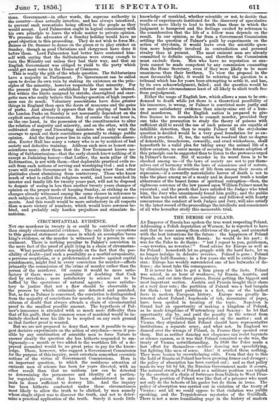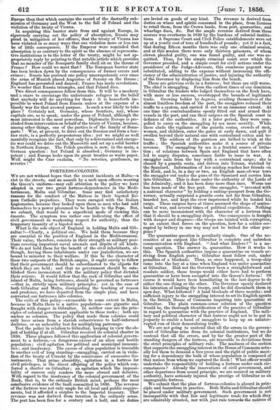THE DEMISE OF POLAND.
An Emperor of Russia has spoken the true word respecting Poland. Addressing a Polish deputation at Warsaw, he is reported to have said that he came among them oblivious of the past, and animated with the best intentions for the future : the happiness of Poland depends on her union with Russia : he would do his part ; it was for the Poles to do theirs : "but I repeat to you, gentlemen, —no reveries, no reveries 1" Good advice for Europe as well as for Poland : henceforth let us grapple with the hard facts, let ris no longer indulge in delusive reveries. Poland is gone ; Poland is already half-Russian; in a few years she will be entirely Rus- sian: Europe has weakly surrendered one of her bulwarks of de- fence ; she must take the consequences.
It is never too late to get a firm grasp of the facts. Poland was seized, in an hour of weakness, by Russia, Austria, and Prussia, and cut into three pieces, Russia getting the biggest and most important section. Austria and Prussia bought their share at a very dear rate ; the partition of Poland was a bad bargain for them : but that partition is a fact, one of the hardest facts in modern European history. Europe was greatly in- terested about Poland ; hogsheads of ink, mountains of paper, have been spoiled in treating of the topic. Napoleon le Grand had an opportunity of making a kingdom of Poland, as he made kingdoms of Wurtemberg and Saxony: he let that opportunity slip by, and paid the penalty in the retreat from Moscow. Lord Castlereagh negotiated on the matter ; and at Vienna they stipulated that Poland should have representative institutions, a separate army, and what not. In England we danced over the wrongs of Poland, in France they spouted over them. But as neither dancing nor eloquence can resist bayonets or silence cannon, so it was that Poland remained as she was, the treaty of Vienna notwithstanding. In 1830 the Poles made a last effort for themselves—neither dancing nor speechi
but fighting like men of sense. Alas ! it availed them not They were beaten by overwhelming odds. From that day to this the hold of Russia on Poland has been growing firmer and stronger; the policy of absorption has bden carried out ; and as that policy made its way bit by bit, the Russian Government made it secure. The natural strength of Poland as a military position was tripled by the erection of a chain of fortresses from Galicia to West Prue- sm. The position of Poland was like that of a prisoner who must not only do the behests of his gaoler but do them in irons. The policy of absorption was carried out in violation of the treaty of Vienna ; and all we could oppose to that violation was public* speaking, and the Terpsichorean mysteries of the Guilt:Mall. There is not a more humiliating page in the history of modern Europe than that which contains the record of the dastardly sub- mission of Germany and the West to the fall of Poland and the violation of the treaty of Vienna. In acquiring this barrier state from and against Europe, in rigorously carrying out the policy of absorption, Russia may plead in mitigation of her offence, that the treaty of Vienna has been violated m so many ways that one violation more or less can be of little consequence. If the Emperor were reminded that absorption is as contrary to the spirit as the absence of representa- tive institutions is to the letter of the treaty, might he not ap- propriately reply by pointing to that notable article which provides that no member of the Bonaparte family shall sit on the throne of France ? How could we meet that? The European barrier state has been broken dpwn by the consequences of former errors and erimes ; Russia has pursued one policy unscrupulously ever since the arms of Munich placed Augustus of Saxony on the throne ; England has perorated and danced; France has made revolutions. No wonder that Russia triumphs, and that Poland dies.
Two direct consequences follow from this. It will be a mockery and a snare to encourage the unfortunate refugees in the belief that anybody will do" anything for them : it is henceforth im- possible to wrest Poland from Russia unless at the expense of a bloody, war for that avowed purpose. Is such a war likely to take place ? Certainly not. Germany, whose frontiers, nay, whose capitals are, so to speak, under the guns of Poland, although the most interested is the most powerless. Diplomatic Europe is pre- cluded from intervention on behalf of the treaty of Vienna, because, among other things, one of the parties is of the family of Bona- parte! War, at present, to drive out the Russian and form a bar- rier state, is a perfectly preposterous idea: yet we might as well manfully recognize the fact, that only by a determined and energe- tic war could we drive out the Muscovite and set up a solid barrier in Northern Europe. The Polish question is now, in the main, a German question : but Poland is absorbed ; Germany is impotent; and Europe looks upon its great treaties as waste paper.
Well might the Czar exclaim, "No reveries, gentlemen, no reveries ! "



































 Previous page
Previous page